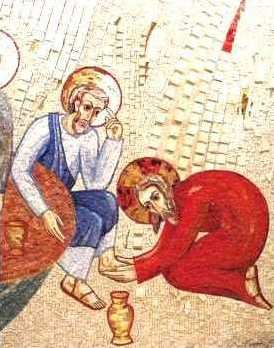
This question is dangerous. It can lead us to select some beautiful qualities of service and feel satisfied because we have dissected and analyzed the traits of Jesus as the obedient Servant. Who can deny that a true servant should be Teachable, Submissive, Patient, Diligent. Productive, Loyal and Honest? We could use other equally good descriptors and the effort is always worth doing because Christ defined His mission just with one word: Serving.
But the attitude of service was not merely something Jesus taught others about…he displayed it!
Nothing is said of service in the abstract; Jesus exhibits the attitude required of the disciples in active service. He does not talk of a virtue but points to something that he does. Please, take note of the following story. Especially if you are a religious leader or superior:
During the American Revolution, a man in civilian clothes rode past a group of soldiers who were busy pulling out a horse carriage stuck in deep mud. Their officer was shouting instructions to them while making no attempt to help. The stranger who witnessed the scene asked the officer why he was not helping. With great dignity, the officer replied: Sir, I am a Corporal! The stranger dismounted from his horse and proceeded to help the exhausted soldiers himself. When the job was completed, he turned to the corporal and said: Mr. Corporal, next time you have a job like this, and don’t have enough men to do it, inform your commander-in-chief, and I will come and help you again. Too late, the proud Corporal recognized General Washington.
Yes, today’s Gospel text deals with a particularly sensitive issue, because even for people with a warm heart, cool head and working hands it is not easy to do the right thing and to guess what would be the timely and helpful service to perform. We need to be in a state of permanent prayer not let ourselves be misled by our good intentions (mixed with our personal interests and self-centeredness):
* Martha, Martha, you are anxious and worried about many things. There is need of only one thing. Mary has chosen the better part and it will not be taken from her.
* Lord do you wash my feet? … You shall never wash my feet (Jn 13:6,8).
Frequently our hearts look for something very big, something wanting a lot of sacrifice, and often our heart does not see the humble things. We must learn to do the humble things and often they are the most difficult to do, because we are truly shortsighted. This is why I would ask you to join me in making a personal reflection on how to translate to our lives the example of Jesus, the saints and many true servants of the kingdom.
Here is another inspiring example:
In 1952, there was a man who had arrived at a railroad station to receive the Nobel Peace Prize. When he stepped off the train, the cameras flashed and city officials approached to meet him; he thanked them politely and he asked to be excused for a minute. He walked through the crowd to the side of an elderly woman struggling with two large suitcases. He picked them up, smiled, and escorted her to her bus, helped her get on, and wished her a safe journey. Then Albert Schweitzer, the famous medical missionary from Africa, turned to the crowd and apologized for keeping them waiting. A member of the reception committee told a reporter: That’s the first time I ever saw a sermon walking.
Allow me to insist on the priority of service:
The theologies, the philosophies, the scientific specialties would be useless without this very profound concept of service, whose first example was given by Christ when he washed the feet of his disciples, and he did not allow them to wash his (Fernando Rielo, Feb. 27, 1982).
As Christ’s disciples, we are not better than other people who serve generously and with admirable detachment. The difference is that we have the privilege of serving alongside Jesus, and in his presence, which means that we bring our neighbor to God and we bring God to our neighbor, because we are guided by the example of Christ, and therefore He becomes visible in our humble deeds. Is not that a privilege? And is it not serving Jesus himself? We know that Jesus has come before us and has already identified with those in need, getting the message across that I am with you, the Spirit is with you, you are loved even as I am loved by my Father.
It is often said that the secret of being happy is doing things for other people. Gandhi concluded from his own experience that the best way to find yourself, is to lose yourself in the service of others. Even the Chinese wisdom says the same thing in a wise proverb:
If you want happiness for an hour, take a nap. If you want happiness for a day, go fishing. If you want happiness for a month, get married. If you want happiness for a year, inherit a fortune. If you want happiness for a lifetime, help someone else.
We mentioned Albert Schweitzer above; From his perspective as an evangelizer and servant of the poorest, he said this to a group of students: I don’t know what your destiny will be, but one thing I know: the only ones among you who will be really happy are those who have sought and found a way to serve. Why this is so? Because, if we look at our own serving experience, when we serve we become who we are and what we do. In those humble things we can do for our neighbor, we share in the cup of suffering in our ordinary lives, giving ourselves for the good of others. On the other hand, you will know that life has slipped away when your passion for helping others grows cold.
The words of Leo Tolstoy will resonate in the hearts of many people both within and outside the Christian world: The simplest and shortest ethical precept is to be served as little as possible… and to serve others as much as possible.
But let us be realistic; oftentimes, people we try to serve are not grateful and all our efforts are never enough to satisfy them. Only He can give us the patience, courage, humility and perseverance to do good even when we are ridiculed and misunderstood. We will not be exempted from suffering when doing good.
The First Reading, written some six centuries before the birth of Christ, announces the victory of the Suffering Servant, who is put to death for being the servant of God, but ultimately rewarded and delivered by God from eternal death. This has always been al will be the case: Though the servant suffers and dies, a greater good comes forth.
What happens when we serve in His name? Mostly unexpected things. And usually invisible for the person who serves. Our humble good works are like tiny stones cast into the pool of time; though the stones themselves may disappear, their ripples extend to eternity. Very much like the poor widow that Jesus praised when she put all that she had into the treasury. Mysteriously but surely this kind of living for others and dying to self becomes the means of sharing more fully in the life of God.
John Ruskin, the 18th century English writer, was visiting with a friend, and he was standing looking out the front window of the house. It was night-time, and the lamp-lighter was lighting the street lamps. From the window one could see only the lamps that were being lit, and the light the lamp-lighter was carrying from one lamp to another. The lamp-lighter himself could not be seen. Ruskin remarked that the lamp-lighter was a good example of the genuine Christian. His way was clearly lit by the lights he lit, and the light he kept burning, even though he himself may not be known or seen. At the beginning of the gospel, Jesus said that He was the light that had come into the world.
The greatest reward for doing good is the opportunity to do more. As we are then faithful in small things, so God gives us authority in greater things that the world cannot understand or carry out:
A well-dressed woman was on safari in a poor country. The group stopped briefly at a hospital for lepers. The heat was intense, the flies buzzing. She noticed a nurse bending down in the dirt, tending to the pus-filled sores of a leper. With disdain the woman remarked: Why, I wouldn’t do that for all the money in the world! The nurse quietly replied: Neither would I.
Mary called herself “God’s servant, God’s slave” and opened herself in freedom to what was asked of her. And we all know what was God’s impressive response through his grace. Certainly, one of the most fascinating outcomes of any life touched by the presence of Christ is the awakening of a desire to serve him in every area of life.
Mary called herself “God’s servant, God’s slave” and opened herself in freedom to what was asked of her. And we all know what was God’s impressive response through his grace. Certainly, one of the most fascinating outcomes of any life touched by the presence of Christ is the awakening of a desire to serve him in every area of life.
The first condition to start serving. In the parable of the Good Samaritan we see that the very first thing we need to serve is to notice there is someone hurting. He was aware that someone was in need. The other characters of the story had deceitfully hardened hearts. Yes, first as Christ’s disciples we must become aware of those who are in need, whether physically, emotionally, or spiritually, because they are out there, not that far from our front doors and they are also in our own house and community. The Second Reading tells us: We do not have a high priest who is unable to sympathize with our weaknesses. Let us beg the Holy Spirit every day to awaken our sensitivity. Rabindranath Tagore wrote this well-known short poem: I slept and dreamt that life was joy. I awoke and saw that life was service. I acted and behold, service was joy.
And proper care can take some time. This explains why sometimes we are able to treat with affection the sick we visit but we get tired to help brothers and sisters at home.
A final remark. Jesus is giving us today a shining example of education of the ecstasy. James and John are ambitious and self-centered, but Jesus does not scold them, rather He seeks to redirect their ambition. The reply of Jesus to the disciples is a call to abnegation and self-commitment. When our energy is no longer directed at ourselves, we do not need to protect ourselves or to strive for mundane things, instead, we expend all our energy in serving.
Tips to make the most of the Holy Mass
12. The Communion Rite. The Rite of Peace and The Fraction of the Bread.By the Rite of Peace, the Church entreats peace and unity for herself and for the whole human family, and the faithful express to each other their communion and mutual charity before communicating in the Sacrament. As for the actual sign of peace to be given, the manner is to be established by the Conferences of Bishops in accordance with the culture and customs of the peoples. However, it is appropriate that each person, in a sober manner, offer the sign of peace only to those who are nearest.
The priest breaks the Eucharistic Bread, with the assistance, if the case requires, of the deacon or a concelebrant. The gesture of breaking bread done by Christ at the Last Supper, signifies that the many faithful are made one body (1Cor 10:17) by receiving Communion from the one Bread of Life, which is Christ. The Priest or the deacon breaks the Bread and puts a piece of the host into the chalice to signify the unity of the Body and Blood of the Lord in the work of salvation. The supplication Agnus Dei (Lamb of God…) is sung by the choir or cantor with the congregation replying; or recited aloud.











